外研版(2019)选择性必修 第四册Unit 6 Space and beyond Understanding ideas课件(共25张PPT)
文档属性
| 名称 | 外研版(2019)选择性必修 第四册Unit 6 Space and beyond Understanding ideas课件(共25张PPT) |  | |
| 格式 | pptx | ||
| 文件大小 | 5.7MB | ||
| 资源类型 | 教案 | ||
| 版本资源 | 外研版(2019) | ||
| 科目 | 英语 | ||
| 更新时间 | 2023-05-23 18:30:05 | ||
图片预览

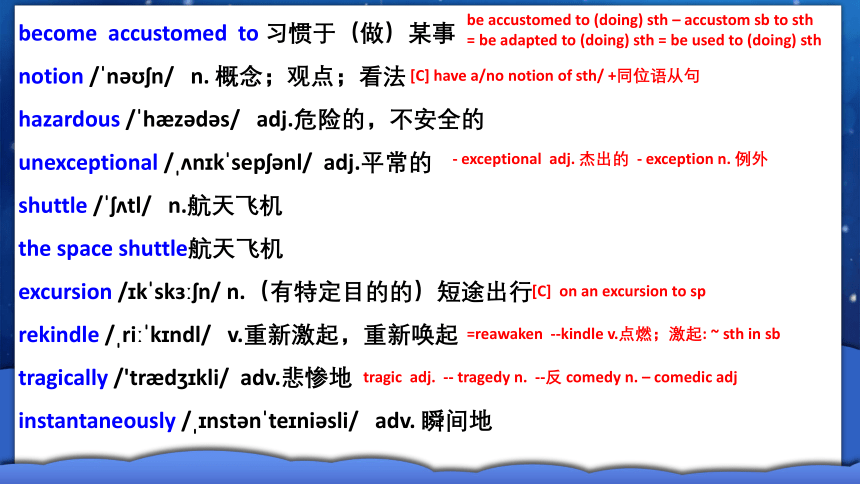
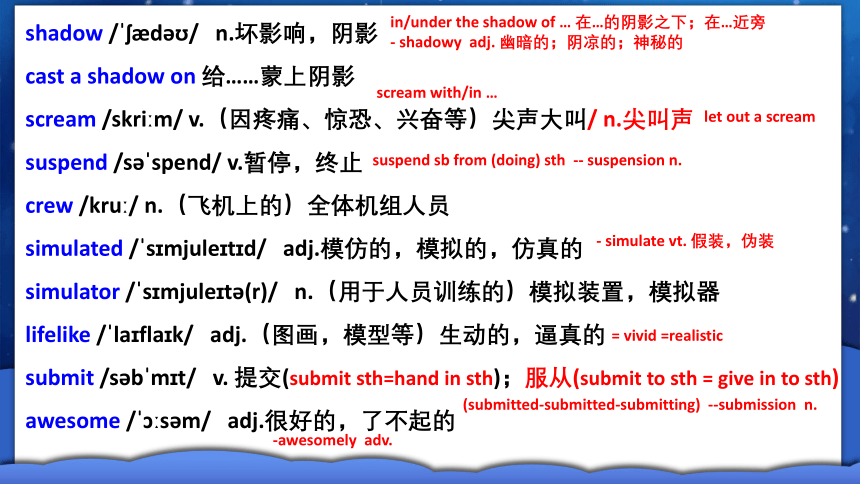
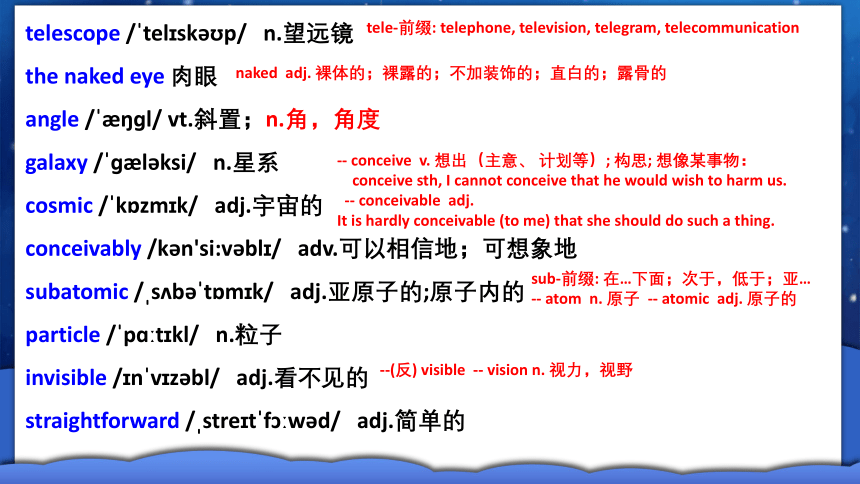
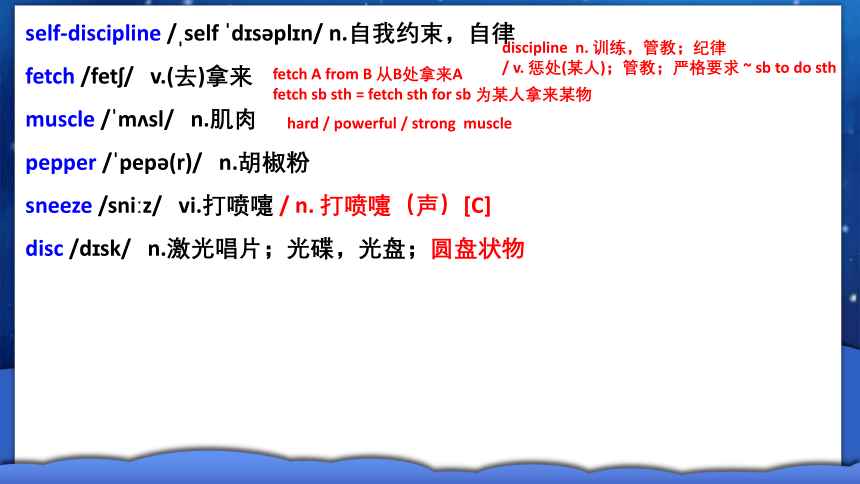
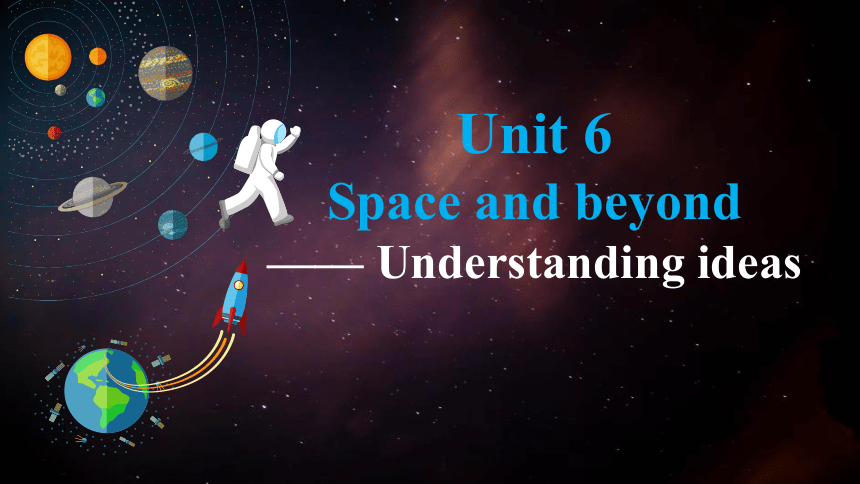
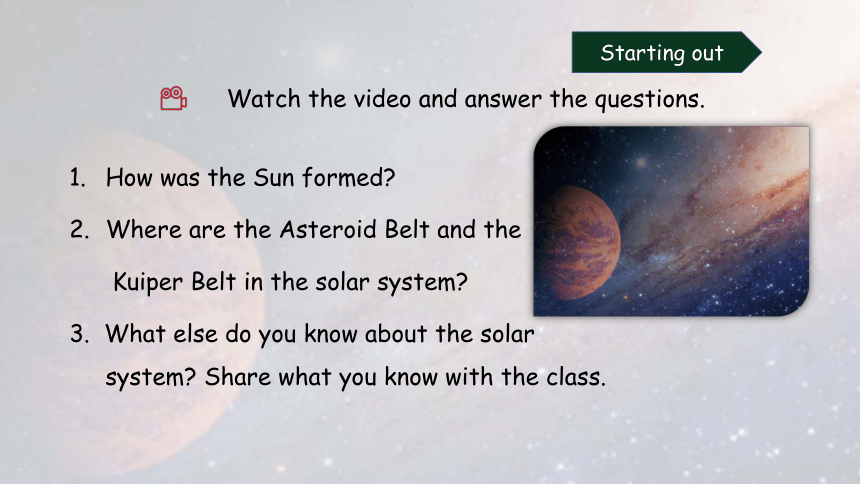
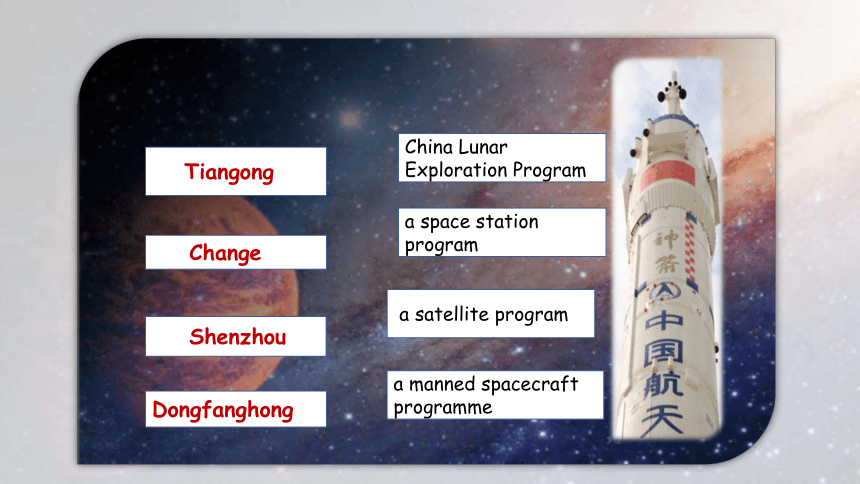
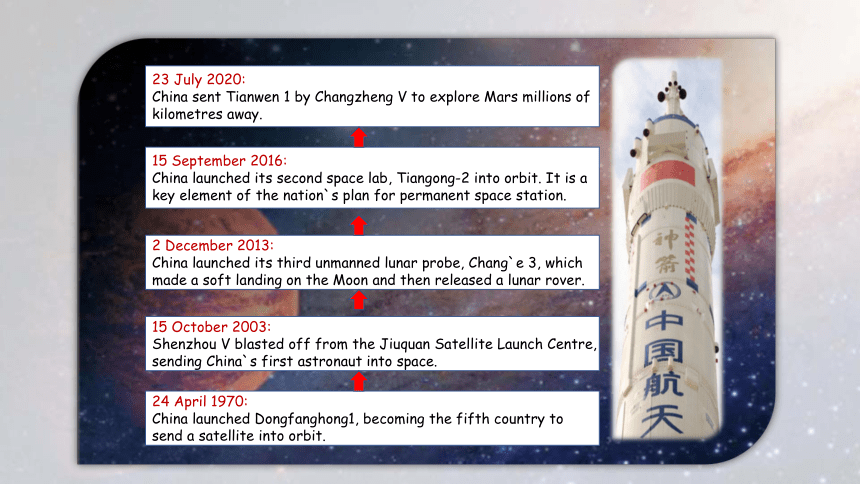
文档简介
(共25张PPT)
Unit 6
Space and beyond
words and expressions
become accustomed to 习惯于(做)某事
notion / n n/ n. 概念;观点;看法
hazardous / h z d s/ adj.危险的,不安全的
unexceptional / n k sep nl/ adj.平常的
shuttle / tl/ n.航天飞机
the space shuttle航天飞机
excursion / k sk n/ n.(有特定目的的)短途出行
rekindle / ri k ndl/ v.重新激起,重新唤起
tragically /'tr d kli/ adv.悲惨地
instantaneously / nst n te ni sli/ adv. 瞬间地
be accustomed to (doing) sth – accustom sb to sth
= be adapted to (doing) sth = be used to (doing) sth
[C] have a/no notion of sth/ +同位语从句
- exceptional adj. 杰出的 - exception n. 例外
[C] on an excursion to sp
=reawaken --kindle v.点燃;激起: ~ sth in sb
tragic adj. -- tragedy n. --反 comedy n. – comedic adj
shadow / d / n.坏影响,阴影
cast a shadow on 给……蒙上阴影
scream /skri m/ v.(因疼痛、惊恐、兴奋等)尖声大叫/ n.尖叫声
suspend /s spend/ v.暂停,终止
crew /kru / n.(飞机上的)全体机组人员
simulated / s mjule t d/ adj.模仿的,模拟的,仿真的
simulator / s mjule t (r)/ n.(用于人员训练的)模拟装置,模拟器
lifelike / la fla k/ adj.(图画,模型等)生动的,逼真的
submit /s b m t/ v. 提交(submit sth=hand in sth);服从(submit to sth = give in to sth)
awesome / s m/ adj.很好的,了不起的
in/under the shadow of … 在…的阴影之下;在…近旁
- shadowy adj. 幽暗的;阴凉的;神秘的
scream with/in …
let out a scream
suspend sb from (doing) sth -- suspension n.
- simulate vt. 假装,伪装
= vivid =realistic
(submitted-submitted-submitting) --submission n.
-awesomely adv.
telescope / tel sk p/ n.望远镜
the naked eye 肉眼
angle / ɡl/ vt.斜置;n.角,角度
galaxy / ɡ l ksi/ n.星系
cosmic / k zm k/ adj.宇宙的
conceivably /k n'si:v bl / adv.可以相信地;可想象地
subatomic / s b t m k/ adj.亚原子的;原子内的
particle / pɑ t kl/ n.粒子
invisible / n v z bl/ adj.看不见的
straightforward / stre t f w d/ adj.简单的
tele-前缀: telephone, television, telegram, telecommunication
naked adj. 裸体的;裸露的;不加装饰的;直白的;露骨的
-- conceive v. 想出(主意﹑ 计划等); 构思; 想像某事物:
conceive sth, I cannot conceive that he would wish to harm us.
-- conceivable adj.
It is hardly conceivable (to me) that she should do such a thing.
sub-前缀: 在…下面;次于,低于;亚…
-- atom n. 原子 -- atomic adj. 原子的
--(反) visible -- vision n. 视力,视野
self-discipline / self d s pl n/ n.自我约束,自律
fetch /fet / v.(去)拿来
muscle / m sl/ n.肌肉
pepper / pep (r)/ n.胡椒粉
sneeze /sni z/ vi.打喷嚏 / n. 打喷嚏(声)[C]
disc /d sk/ n.激光唱片;光碟,光盘;圆盘状物
discipline n. 训练,管教;纪律
/ v. 惩处(某人);管教;严格要求 ~ sb to do sth
fetch A from B 从B处拿来A
fetch sb sth = fetch sth for sb 为某人拿来某物
hard / powerful / strong muscle
Unit 6
Space and beyond
—— Understanding ideas
How was the Sun formed
Where are the Asteroid Belt and the
Kuiper Belt in the solar system
3. What else do you know about the solar system Share what you know with the class.
Watch the video and answer the questions.
Starting out
Dongfanghong
Shenzhou
Change
Tiangong
a satellite program
a manned spacecraft programme
China Lunar Exploration Program
a space station program
24 April 1970:
China launched Dongfanghong1, becoming the fifth country to send a satellite into orbit.
15 October 2003:
Shenzhou V blasted off from the Jiuquan Satellite Launch Centre, sending China`s first astronaut into space.
2 December 2013:
China launched its third unmanned lunar probe, Chang`e 3, which made a soft landing on the Moon and then released a lunar rover.
15 September 2016:
China launched its second space lab, Tiangong-2 into orbit. It is a key element of the nation`s plan for permanent space station.
23 July 2020:
China sent Tianwen 1 by Changzheng V to explore Mars millions of kilometres away.
Which of these spacecraft had a human on board when launched
What are the recent events in China’s space programme Add them to the timeline.
What do you know about China’s future plans for space exploration
Look at the timeline and answer the questions.
The Call of the Challenger
1 The first satellite was launched by the USSR in ___.
A 1945 B 1962 C 1957
2 The first person in space was ___________.
A Robert Crippen B Yuri Gagarin C Neil Armstrong
3 The first person to walk in space was _________.
A Alexei Leonov B William McCool C Yang Liwei
4 The first space station was Sylyut, which was launched by ______.
A the USA B the USSR C the European Space Agency
5 The first spacecraft to leave the solar system was ________.
A Vostok 1 B Discovery C Voyager 1
Do you know these
space exploration “ Firsts”
Skim the text and match the general idea of each paragraph.
Para 1
Para 2
Para 3
Para 4
Para 5
Para 6
A. The take-off of the Challenger space shuttle.
B. The explosion of the Challenger from a student’s eye.
C. The description of Armstrong’s landing on the Moon.
D. The space accident cast a shadow on people’s hearts.
E. The space shuttle programme went on with the launch of Discovery.
F. The astronauts’ heroic deeds inspire us to continue the space exploration.
C
A
D
B
E
F
The call of Challenger
Activity 1
Predicting
Look at the title of the passage and the picture. Predict what the passage is about.
Now read the passage and check your prediction.
The call of Challenger
Activity 2
Reading for general ideas
Skim the text and match the general idea of each paragraph.
Para 1
Para 2
Para 3
Para 4
Para 5
Para 6
A. The take-off of the Challenger space shuttle.
B. The explosion of the Challenger from a student’s eye.
C. The description of Armstrong’s landing on the Moon.
D. The space accident cast a shadow on people’s hearts.
E. The space shuttle programme went on with the launch of Discovery.
F. The astronauts’ heroic deeds inspire us to continue the space exploration.
C
A
D
B
E
F
People thought space travel was no longer dangerous.
Christa would have inspired lots of people if she hadn’t lost her life on board the Challenger.
People were determined to continue with the space programme after the disaster.
The disaster proved we should use robots to explore space instead of people.
The shuttle was not reliable and should not have been used.
Choose the ideas mentioned in the passage and find the evidence.
Activity 3
Reading for detailed ideas
Activity 4
Close reading
What was special about the Challenger launch
It was special because Christa McAuliffe aged 37, an ordinary teacher and mother, was about to become the first civilian in space.
Activity 3
Close reading
What was the teacher’s mission on board the Challenger
She planned to give two 15-minute lessons from orbit: the first to demonstrate the controls of the spacecraft and explain how gravity worked, and the second to describe the objectives of the Challenger programme.
Activity 3
Close reading
What was done in the three years following the disaster
Space shuttle flights were suspended for nearly three years while the cause of the disaster was investigated, and some of the shuttle’s components were redesigned.
Activity 3
Close reading
Which shuttle followed the Challenger, and when was it launched
Discovery followed the Challenger, and was launched on 29 September 1988.
Activity 4
Close reading
Could you summarize the text after the close reading
With Neil Armstrong’s successful landing on the Moon on 20 July 1969,and other landings, people became accustomed to the notion of space travel. However, the disaster of the Challenger on 28 January 1986,cast a shadow on people’s hearts. Dangerous as it is, people never stop the pace of space exploration, and on 29 September 1988 witnessed the successful launch of Discovery. The heroic deeds of the astronauts inspire us to go on with the exploration.
Activity 4
Food for thought
Why do you think people continue to explore space despite the risks
How do you understand the title “The call of challenger” now
Would you like to go into space Give your reasons.
Comments from Internet
“I would like to go to space as you can float around and see what we live on!!!”
“I would love to be an astronaut, it has been a dream of mine! I think that the planets and the universe are super interesting to learn about!”
“I would love to go to space, it would be an amazing experience, plus only around 1 in 1.3 million people become astronauts, so it would be a once in a lifetime experience.”
Comments from Internet
“I would love to go to space because I have loved reading and researching space. I would love to see some spiral galaxies while I'm in space.”
“I would like to go to space but I would be very scared, what if you got lost ”
“Travelling in space would be fun because you would be able to float around, but scary because you might run out of food or oxygen.”
Some people think the money spent developing technology for space is not justified. There are some beneficial ways to spend this money. To what extent do you agree or disagree
Write an argumentative essay around 150 words.
Assignment
Unit 6
Space and beyond
words and expressions
become accustomed to 习惯于(做)某事
notion / n n/ n. 概念;观点;看法
hazardous / h z d s/ adj.危险的,不安全的
unexceptional / n k sep nl/ adj.平常的
shuttle / tl/ n.航天飞机
the space shuttle航天飞机
excursion / k sk n/ n.(有特定目的的)短途出行
rekindle / ri k ndl/ v.重新激起,重新唤起
tragically /'tr d kli/ adv.悲惨地
instantaneously / nst n te ni sli/ adv. 瞬间地
be accustomed to (doing) sth – accustom sb to sth
= be adapted to (doing) sth = be used to (doing) sth
[C] have a/no notion of sth/ +同位语从句
- exceptional adj. 杰出的 - exception n. 例外
[C] on an excursion to sp
=reawaken --kindle v.点燃;激起: ~ sth in sb
tragic adj. -- tragedy n. --反 comedy n. – comedic adj
shadow / d / n.坏影响,阴影
cast a shadow on 给……蒙上阴影
scream /skri m/ v.(因疼痛、惊恐、兴奋等)尖声大叫/ n.尖叫声
suspend /s spend/ v.暂停,终止
crew /kru / n.(飞机上的)全体机组人员
simulated / s mjule t d/ adj.模仿的,模拟的,仿真的
simulator / s mjule t (r)/ n.(用于人员训练的)模拟装置,模拟器
lifelike / la fla k/ adj.(图画,模型等)生动的,逼真的
submit /s b m t/ v. 提交(submit sth=hand in sth);服从(submit to sth = give in to sth)
awesome / s m/ adj.很好的,了不起的
in/under the shadow of … 在…的阴影之下;在…近旁
- shadowy adj. 幽暗的;阴凉的;神秘的
scream with/in …
let out a scream
suspend sb from (doing) sth -- suspension n.
- simulate vt. 假装,伪装
= vivid =realistic
(submitted-submitted-submitting) --submission n.
-awesomely adv.
telescope / tel sk p/ n.望远镜
the naked eye 肉眼
angle / ɡl/ vt.斜置;n.角,角度
galaxy / ɡ l ksi/ n.星系
cosmic / k zm k/ adj.宇宙的
conceivably /k n'si:v bl / adv.可以相信地;可想象地
subatomic / s b t m k/ adj.亚原子的;原子内的
particle / pɑ t kl/ n.粒子
invisible / n v z bl/ adj.看不见的
straightforward / stre t f w d/ adj.简单的
tele-前缀: telephone, television, telegram, telecommunication
naked adj. 裸体的;裸露的;不加装饰的;直白的;露骨的
-- conceive v. 想出(主意﹑ 计划等); 构思; 想像某事物:
conceive sth, I cannot conceive that he would wish to harm us.
-- conceivable adj.
It is hardly conceivable (to me) that she should do such a thing.
sub-前缀: 在…下面;次于,低于;亚…
-- atom n. 原子 -- atomic adj. 原子的
--(反) visible -- vision n. 视力,视野
self-discipline / self d s pl n/ n.自我约束,自律
fetch /fet / v.(去)拿来
muscle / m sl/ n.肌肉
pepper / pep (r)/ n.胡椒粉
sneeze /sni z/ vi.打喷嚏 / n. 打喷嚏(声)[C]
disc /d sk/ n.激光唱片;光碟,光盘;圆盘状物
discipline n. 训练,管教;纪律
/ v. 惩处(某人);管教;严格要求 ~ sb to do sth
fetch A from B 从B处拿来A
fetch sb sth = fetch sth for sb 为某人拿来某物
hard / powerful / strong muscle
Unit 6
Space and beyond
—— Understanding ideas
How was the Sun formed
Where are the Asteroid Belt and the
Kuiper Belt in the solar system
3. What else do you know about the solar system Share what you know with the class.
Watch the video and answer the questions.
Starting out
Dongfanghong
Shenzhou
Change
Tiangong
a satellite program
a manned spacecraft programme
China Lunar Exploration Program
a space station program
24 April 1970:
China launched Dongfanghong1, becoming the fifth country to send a satellite into orbit.
15 October 2003:
Shenzhou V blasted off from the Jiuquan Satellite Launch Centre, sending China`s first astronaut into space.
2 December 2013:
China launched its third unmanned lunar probe, Chang`e 3, which made a soft landing on the Moon and then released a lunar rover.
15 September 2016:
China launched its second space lab, Tiangong-2 into orbit. It is a key element of the nation`s plan for permanent space station.
23 July 2020:
China sent Tianwen 1 by Changzheng V to explore Mars millions of kilometres away.
Which of these spacecraft had a human on board when launched
What are the recent events in China’s space programme Add them to the timeline.
What do you know about China’s future plans for space exploration
Look at the timeline and answer the questions.
The Call of the Challenger
1 The first satellite was launched by the USSR in ___.
A 1945 B 1962 C 1957
2 The first person in space was ___________.
A Robert Crippen B Yuri Gagarin C Neil Armstrong
3 The first person to walk in space was _________.
A Alexei Leonov B William McCool C Yang Liwei
4 The first space station was Sylyut, which was launched by ______.
A the USA B the USSR C the European Space Agency
5 The first spacecraft to leave the solar system was ________.
A Vostok 1 B Discovery C Voyager 1
Do you know these
space exploration “ Firsts”
Skim the text and match the general idea of each paragraph.
Para 1
Para 2
Para 3
Para 4
Para 5
Para 6
A. The take-off of the Challenger space shuttle.
B. The explosion of the Challenger from a student’s eye.
C. The description of Armstrong’s landing on the Moon.
D. The space accident cast a shadow on people’s hearts.
E. The space shuttle programme went on with the launch of Discovery.
F. The astronauts’ heroic deeds inspire us to continue the space exploration.
C
A
D
B
E
F
The call of Challenger
Activity 1
Predicting
Look at the title of the passage and the picture. Predict what the passage is about.
Now read the passage and check your prediction.
The call of Challenger
Activity 2
Reading for general ideas
Skim the text and match the general idea of each paragraph.
Para 1
Para 2
Para 3
Para 4
Para 5
Para 6
A. The take-off of the Challenger space shuttle.
B. The explosion of the Challenger from a student’s eye.
C. The description of Armstrong’s landing on the Moon.
D. The space accident cast a shadow on people’s hearts.
E. The space shuttle programme went on with the launch of Discovery.
F. The astronauts’ heroic deeds inspire us to continue the space exploration.
C
A
D
B
E
F
People thought space travel was no longer dangerous.
Christa would have inspired lots of people if she hadn’t lost her life on board the Challenger.
People were determined to continue with the space programme after the disaster.
The disaster proved we should use robots to explore space instead of people.
The shuttle was not reliable and should not have been used.
Choose the ideas mentioned in the passage and find the evidence.
Activity 3
Reading for detailed ideas
Activity 4
Close reading
What was special about the Challenger launch
It was special because Christa McAuliffe aged 37, an ordinary teacher and mother, was about to become the first civilian in space.
Activity 3
Close reading
What was the teacher’s mission on board the Challenger
She planned to give two 15-minute lessons from orbit: the first to demonstrate the controls of the spacecraft and explain how gravity worked, and the second to describe the objectives of the Challenger programme.
Activity 3
Close reading
What was done in the three years following the disaster
Space shuttle flights were suspended for nearly three years while the cause of the disaster was investigated, and some of the shuttle’s components were redesigned.
Activity 3
Close reading
Which shuttle followed the Challenger, and when was it launched
Discovery followed the Challenger, and was launched on 29 September 1988.
Activity 4
Close reading
Could you summarize the text after the close reading
With Neil Armstrong’s successful landing on the Moon on 20 July 1969,and other landings, people became accustomed to the notion of space travel. However, the disaster of the Challenger on 28 January 1986,cast a shadow on people’s hearts. Dangerous as it is, people never stop the pace of space exploration, and on 29 September 1988 witnessed the successful launch of Discovery. The heroic deeds of the astronauts inspire us to go on with the exploration.
Activity 4
Food for thought
Why do you think people continue to explore space despite the risks
How do you understand the title “The call of challenger” now
Would you like to go into space Give your reasons.
Comments from Internet
“I would like to go to space as you can float around and see what we live on!!!”
“I would love to be an astronaut, it has been a dream of mine! I think that the planets and the universe are super interesting to learn about!”
“I would love to go to space, it would be an amazing experience, plus only around 1 in 1.3 million people become astronauts, so it would be a once in a lifetime experience.”
Comments from Internet
“I would love to go to space because I have loved reading and researching space. I would love to see some spiral galaxies while I'm in space.”
“I would like to go to space but I would be very scared, what if you got lost ”
“Travelling in space would be fun because you would be able to float around, but scary because you might run out of food or oxygen.”
Some people think the money spent developing technology for space is not justified. There are some beneficial ways to spend this money. To what extent do you agree or disagree
Write an argumentative essay around 150 words.
Assignment
